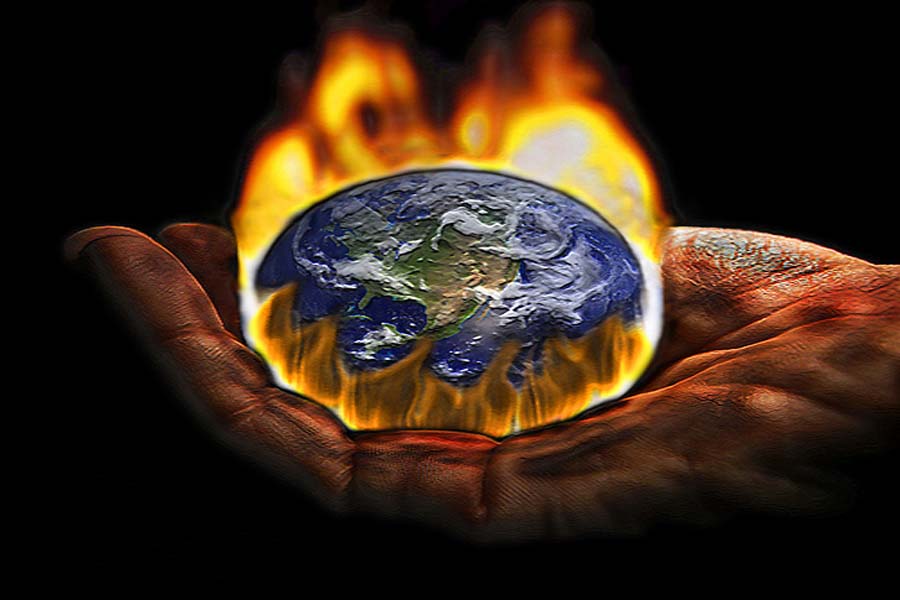Climate change sparks controversy among students
It’s heard in the news frequently. Endangered species, over-polluted areas and greenhouse gases have become day-to-day terms, all relating to one modern issue: global warming.
“Global warming is ultimately the addition of more greenhouse gases to the atmosphere,” Dr. John Heinrichs, associate professor of Geosciences at Fort Hays State University said. “They are being added to the atmosphere faster than the natural process can absorb them.
“The question that comes up is where the gases are coming from. The primary source is human combustion of fossil fuels like coal and oil. The growth in human population added to an increase in our standard of living is what drives it. There are more people living better off so they are burning a lot more fuels.”
Many events are the basis of scientific observation.
“Some of the things that everyone can perceive are changes in the growing season,” Heinrichs said. “We are having longer growing seasons because we have earlier springs and later falls. There are movements of animals to the poles because the poles are getting warmer. There are a lot of animals and plants moving into places where they are not normally found.
“The declining sea ice is impacting polar bears and seals, as well as other organisms. There are diseases such as the Pine Bark Beetle which can kill trees.”
Heinrichs said winters are also warmer than they were 15 or 20 years ago.
“It is a key piece of evidence for global warming. If there was a change such as a brighter sun, it would tend to cause summers to warm, but winters are as well.”
While scientists base their information from found evidence, there are many mixed feelings and beliefs on the truth of the matter.
“I believe the world is showing signs of warming,” senior Jill Pokorny said. “My personal belief is that humans have influence on the natural cycle and amplified it, causing a greater differential from the average cycle.”
Sophomore Holly Donaldson said based on her knowledge and perspective, it could point either way.
“I don’t think the whole world is getting warmer because of ever thinning atmosphere,” Donaldson said. “If the atmosphere has been able to hold up the way it has for millions of years, then the past 100 or so we have been damaging it wouldn’t have that big of an impact.
“I do think that lately weather patterns and natural disasters have been very odd. We should look more into those things than global warming.”
A non-consistent weather pattern influences the beliefs of others.
“Honestly, I think Kansas weather is so bipolar that you can’t really tell if global warming is actually happening,” senior Wendy Zimmerman said. “It’s the same on a global scale.”
However, some doubt the credibility of the evidence.
“I believe global warming is a myth,” junior Max Stieben said. “I am a conservative Republican and I live in America, and there are many other theories which would disprove it.”
Many people claim other events may be causing the earth to warm up.
“In science, when you have a hypothesis, you have to have a mechanism that goes with it,” Heinrichs said. “People could tell me it could be another natural process, and while there could be, you first have to tell me what natural process.
“People will often say scientists have to keep an open mind, but our minds open up once we see compelling evidence, not just saying it could happen another way.”
Heinrichs said the scientists studying climate change have a clear hypothesis and mechanism.
“Showing that global warming isn’t happening isn’t saying there could be another explanation. The other explanation has to have better and more evidence, and that just isn’t happening. The fact is there is no natural process that we know of that would do this.
References such as previous climate changes such as the Ice Ages are also commonly used as a reason global warming is not real.
“What is happening now isn’t the same as the Ice Ages,” Heinrichs said. “You can’t use that as an example.”
Heinrichs said effects of the changing climate can already be seen.
“Temperatures warm and we are going to have difficulty growing certain crops in certain places,” Heinrichs said. “Some animals will simply not be able to survive because their habitat is gone.”
Other long-term effects are also expected to take place.
“One that will certainly happen is as sea levels rise due to the melting ice, parts of the world close to sea level are going to have flooding as a real problem. The one mentioned the most is Bangladesh. Places like that, people are going to have to move, and that is going to be very expensive.”
In response to people’s denial of global warming, Heinrichs said he believes one of the reasons is they don’t understand how thoroughly the subject has been measured.
“I think the bigger reason is because if we were to do what it takes to prevent it, the consequences for society would be very severe,” Heinrichs said. “If they admit we are going through this, then they have to support some of these changes and they don’t want to support them.”
Heinrichs said when talking of global warming, talking about the solution isn’t talking about popping in one kind of light bulb instead of another.
“We are talking major lifestyle changes such as reductions in driving or smaller cars,” Heinrichs said. “Much smaller cars. Probably a combination of both. We are talking about walking, bike riding and train riding. That doesn’t sit too well with a lot of Americans.”
Another change that would be made is the price of fuel.
“Trying to clean up all the fossil fuels that are burnt so they didn’t produce all the CO2 would make fuel much more expensive than it is now,” Heinrichs said.
While driving less, reduced use of lighting and shorter showers may help, it will take more than that to get the job done.
“The changes happen in how things are made and distributed,” Heinrichs said. “That means trains moving people and products and maybe higher density housing. Europe is having a much easier time of dealing with this and they have trains, they bike and they live in apartments. It is a different lifestyle all together.”
14awalters@usd489.com








